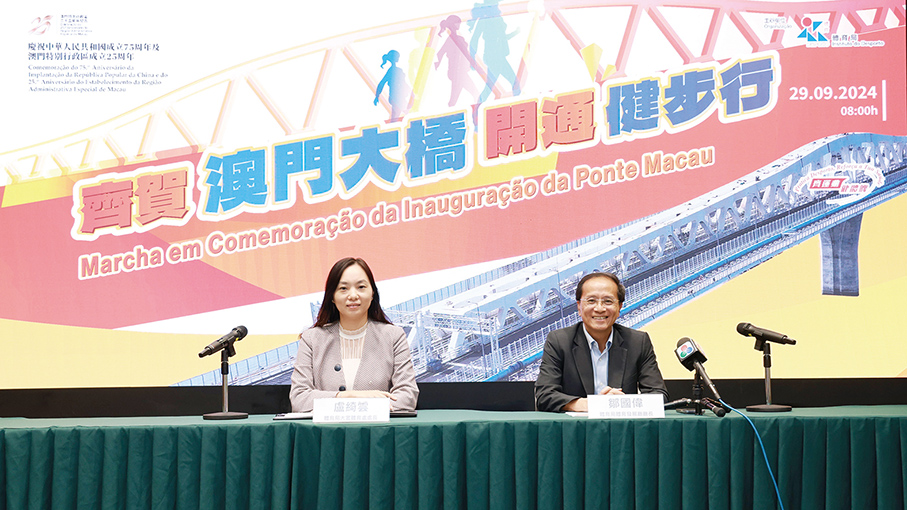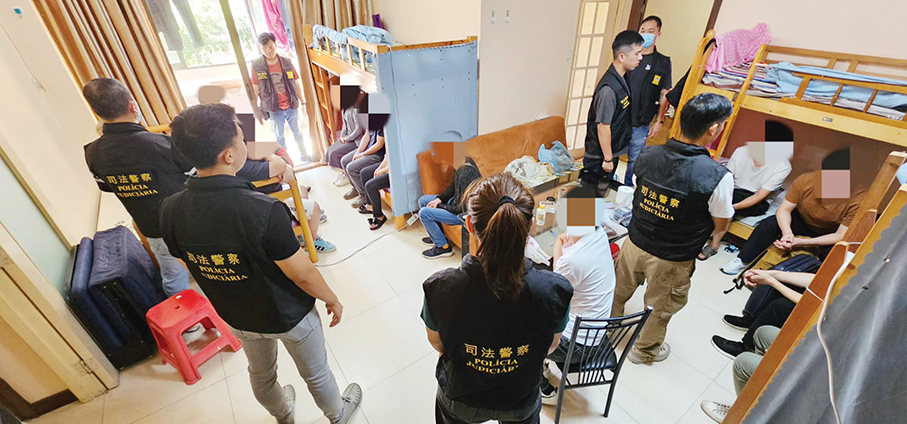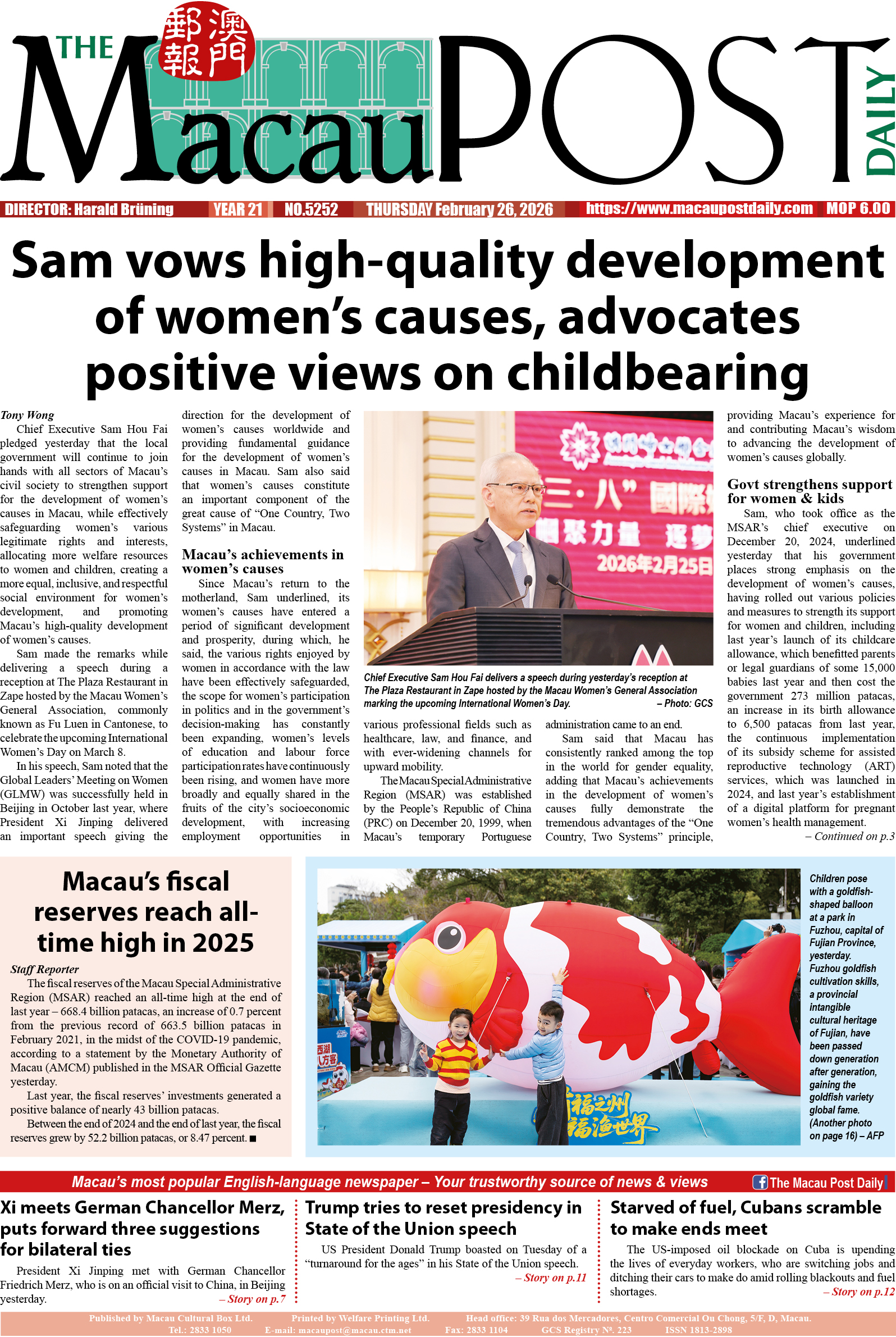Last week’s first-ever Business Conference on Guangdong-Hong Kong-Macau Greater Bay Area Development, at The Venetian Macao, has given the 11-city conurbation a big boost to its envisioned role as a promoter, connector and optimiser for trade and investment between China and the rest of the world.
The conference was co-hosted by the central government’s China Council for the Promotion of International Trade and the regional governments of Guangdong, Hong Kong and Macau.
Initiated by President Xi Jinping, the Greater Bay Area (GBA) was formally set up on July 1, 2017 when the National Development and Reform Commission (NDRC) and the governments of Guangdong, Hong Kong and Macau signed in Hong Kong the Framework Agreement on Deepening Guangdong-Hong Kong-Macau Cooperation in the Development of the Greater Bay Area.
The GBA consists of nine cities in Guangdong province, among them Shenzhen, one of the world’s top high-tech innovation hubs, and the nation’s two special administrative regions of Hong Kong and Macau, the former being one of the world’s leading financial centres and the latter one of the world’s most popular tourist destinations and a World Heritage site listed by UNESCO.
The GBA covers 56,000 square kilometres (about the size of Croatia) and has a population of 86 million (about the population of Germany, the world’s third-largest trading nation and fourth-largest economy).* Its GDP reached almost US$2 trillion last year, close to the one of Italy (US$2.17 trillion), Canada (US$2.09 trillion) and Brazil (US$2.08 trillion), the world’s eighth, ninth and tenth largest economies respectively, according to IMF figures.**
Among the 11 GBA cities, Macau is the smallest in size (33.3 square kilometres) and population (678,800 as of June 2023) and lowest in GDP (US$22.73 billion) but it has the second highest per capita GDP (US$33,784) after Hong Kong (US$49,464), according to 2022 figures.***
The data shows that the GBA, a mere six years after its establishment, has grown into one of the world’s economic power houses – and all this irrespective of the nearly three-year-long adversity caused by the COVID-19 pandemic.
Addressing Thursday’s conference in his capacity as vice-chairman of the National Committee of the Chinese People’s Political Consultative Conference (CPCC), Edmund Ho Hau Wah, the first chief executive of the Macau Special Administrative Region (MSAR), stressed in his key-note speech that the GBA “is a major development strategy planned, launched and promoted by President Xi Jinping.” Edmund Ho quoted Xi as saying when inspecting Guangdong in April this year that the GBA “plays an important strategic role in the nation’s development pattern.”
Edmund Ho described the GBA as “a strategic pivot, a demonstration site for high-quality development and a leader in Chinese-style modernisation.”
The conference, themed “Greater Bay Area, Farsighted Strategy, Extensive Exchange, and Great Development,” was also attended by the central government’s top officials posted to Macau, Liaison Office Director Zheng Xincong and Foreign Ministry Commissioner Liu Xianfa. It included opening remarks by China Council for the Promotion of International Trade President Ren Hongbin and a speech by Deputy Secretary-General of the People’s Government of Guangdong Province Guo Yile, as well as speeches by video link by Hong Kong SAR Chief Executive John Lee Ka-chiu, Communist Party of China (CPC) Leadership Group of the National Development and Reform Commission (NDRC) Member Guo Lanfeng, and CPC Leadership Group Member of the Ministry of Commerce and Vice Minister Guo Tingting.
The list of political heavyweights shows the importance that the central and regional governments gave the two-day conference, which ended on Friday and involved the physical and virtual attendance of 1,000 participants from far and near.
In his speech, Edmund Ho also underlined the fact that the nation’s “economy has shifted from high-speed growth to high-quality development” and that China is nowadays the world’s top trader in goods and number-two trader in services, apart from ranking among the top economies in two-way investment, while its average annual contribution to world economic growth exceeds 30 percent.
Edmund Ho, an accountant by profession, made three suggestions to further boost the GBA’s development:
1) Promoting common development, irrespective of the current situation in which “the world’s geopolitical situation is grim, economic globalisation has encountered counter currents, and the world’s economic recovery momentum is unstable.” Nevertheless, Edmund Ho insisted that, despite all the international conundrums right now, the GBA will remain an important hub connecting China and the world.
2) Strengthening practical cooperation within the “One Country, Two Systems” framework. Edmund Ho underlined that the GBA consists of three separate customs territories (Guangdong, Hong Kong and Macau) and three currencies (renminbi, Hong Kong dollar and pataca), a situation “that is unprecedented in the world.”
According to Edmund Ho, the “GBA is an excellent model that reflects the superiority of China’s system and the complementary advantages of multiple places for mutual win-win results.”
3) Optimising the development environment. Edmund Ho urged the three regional governments to reinforce their efforts in institutional reform and innovation and to accelerate the development and construction of major cooperation platforms, such as those in Hengqin, Nansha and Qianhai.
Besides, he emphasised Macau’s role as a “super connector” between China and the world’s nine Portuguese-speaking countries, based on its “appropriately diversified economy, stable and harmonious society, and multiculturalism.”
Macau’s first chief executive also underlined the GBA’s role in “in making positive contributions to building an open world economy and a community with a shared future for mankind.”
Ho Iat Seng, Macau’s current chief executive, noted in his speech at the opening session of the conference that the GBA is an “important national initiative” launched by President Xi, and that is of “great significance to the implementation of the national development strategy geared towards innovation and the wider opening-up to the outside world.”
He emphasised the various advantages that Macau is offering the GBA, such as being a free port and a low-tax economy based on a “harmonious social environment.”
Ho Iat Seng also underlined Macau’s development strategy based on the concepts of “1+4” and “One Centre, One Platform and One Base”, with the aim of achieving the appropriate diversification of its economy in a timely manner.
The government’s “1+4” model aims to consolidate the development of the city’s tourism and leisure industry while putting special emphasis on promoting the development of four new key industries, namely 1) big health, 2) modern finance, 3) high-tech, and 4) conventions and exhibitions as well as culture and sport.
The “1+4” model was first announced by Chief Executive Ho Iat Seng in November last year in his 2023 Policy Address.
The government’s “One Centre, One Platform and One Base” policy refers to its resolve to further strengthen Macau’s role as a World Centre of Tourism and Leisure, an economic and trade cooperation platform for China and the Portuguese-speaking countries (PSCs), and a cultural exchange and cooperation base.
Ho Iat Seng also said that the Guangdong-Macau In-depth Cooperation Zone in Hengqin is a “new threshold for promoting the appropriate diversification of Macau’s economy.” He also said that the GBA is an “excellent place to live and do business.”
“Our” GBA is similar, to a certain extent, to the development concept of the San Francisco Bay Area that, however, is rather small, having just about 10 million inhabitants in 14 counties covering 26,390 square kilometres, according to its US federal classification.****
I am quite sure that the further development of the Guangdong-Hong Kong-Macau GBA will be the driver and decider of Macau’s future. Let’s see how the GBA will look on July 1, 2027 when it will celebrate the 10th anniversary of its establishment. I am convinced that without its further integration into the GBA, Macau would be unable to ensure the continuation of its high living standard and quality of life. Realistically, Macau needs the GBA more than the latter needs us – but (and there seems to be always a but) our special administrative region can certainly continue to play a unique role in the GBA by leveraging its special advantages such as its “1+4” and “One Centre, One Platform, One Base” strategies, as well as its historic links with the Portuguese-speaking world, Europe, the Chinese and Macanese diaspora, and Southeast Asia.
Within the GBA, I have no doubt, Macau is a special value adder.
– Harald Brüning
*https://www.bayarea.gov.hk/en/home/index.html
**World Economic Outlook Database, April 2023. IMF.org. International Monetary Fund. April 2023, 10.
***https://research.hktdc.com/en/article/MzYzMDE5NzQ5
**** US Office of Management and Budget (Sept 14, 2018). OMB Bulletin 18-04









